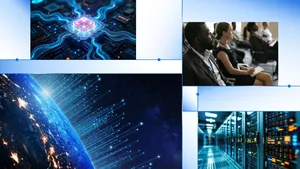Seizing the AI opportunity in Europe

Editor’s note: Kent Walker, President of Global Affairs, delivered remarks at the European Business Summit on November 28, 2023. What follows is an adapted transcript of his speech.
We’re here today at a time of geopolitical change, a time when Europe faces growing competitiveness challenges.
The European Commission President Ursula von der Leyen recently appointed Mario Draghi to lead a special panel on European competitiveness—looking at why European productivity is lagging, and how European leaders can reverse those trends, maintain a competitive edge, and pave the way for a new chapter of prosperity.
A key element of regaining competitive momentum will be the race to harness leading-edge technologies like artificial intelligence.
The technology race is often won not by the country that invents something first, but by the countries that deploy it best.
And here Europe has a real chance to excel.
Europe has an abundance of social innovators who are looking at new ways to tackle societal challenges. A few examples: Through our philanthropic arm Google.org we have supported organizations that are using AI to tackle environmental issues, fact-check misinformation, increase the impact of nonprofits, and find answers to age-old questions.
Google team poses for a photo at the European Business Summit.

These stories show how Europe can help shape the future of AI, with a spirit of optimism about what it can deliver, and the abundance and scientific progress it can create.
Of course many people also have concerns about how the technology may evolve. How do we work together to address those concerns?
It’s time to seize the opportunity of artificial intelligence boldly and responsibly, not just minimizing risk, but maximizing opportunity. After all, the biggest risk may be missing out on AI’s potential.
Getting AI right will take more than just one company or organization. As we outlined in our recent AI Opportunity Agenda, getting AI right won’t happen by accident–we’ll need alignment from governments on frameworks and concrete actions. And we’ll need educators, academics, civil society, and governments to step up and share ideas so that everyone benefits.
In that spirit, today I have the honor of announcing that Google today is launching the Digital Futures Project in Europe.
This project will support researchers, academics, and organizations creating research, analysis, and promoting debate on public policy solutions for the responsible development of AI in Europe.
As part of the global Project, Google.org is committing €5 million to establish a fund, which will provide grants to leading nonprofit think tanks, civil society organizations and academic institutions, on both a national and European level.
Inaugural European grantees include the Fondation Nationale des Sciences Politiques in France, Progressives Zentrum in Germany, think tank CEPS in Belgium, and the OdiseIA network spanning Southern and Northern Europe.
These organizations are working on important questions like…
- How will AI impact labor and the economy?
- How can we turbo-charge European innovation?
- What government and cross-industry efforts can promote research on responsible AI?
- How do we share the benefits of AI with everyone, even as we mitigate risks for vulnerable groups?
We’re keeping up momentum for these AI conversations because we know that bold and responsible are two sides of the same coin.
After all, we've been at this for a while. In 2018 we published a set of AI Principles to guide our work because we believe companies have a duty to design and build these new technologies responsibly from the start.
Tackling these challenges takes fundamental research, common standards, and aligned regulation based on shared democratic values.
For example, to help address the challenge of misinformation, especially with 2024 EU elections coming up, we’re working on technical innovations like our new SynthID watermarking tool for AI-generated images, and services to evaluate online information–like the new “About this Image” feature in Google Search.
This matters because context about the origin of content can help create a safer and more reliable information ecosystem.
Beyond avoiding bias and misinformation, we will need to address the workforce transition. Even as workers become more productive, work will change.
We’ll need to support new approaches to primary and secondary education and expand private-public partnerships to upskill workers.
As an example, since 2015, Google has trained 12 million people across Europe on digital skills through programs such as our Google Career Certificates–and as we expand our work on AI, we’re continuing to partner with governments and NGOs.
Because for all the challenges, let’s not forget that the potential of AI is vast.
I’ve worked in technology for most of my life–and I’ve never seen a time of more promise for the progress of science.
Whether it’s discovering new mRNA vaccines or creating world-class, sustainable manufacturing–machine learning has the potential to benefit every person in Europe.
In total, Google.org will be sending five new teams of Google engineers via the Google.org Fellowship and providing funding and technical help to organizations across Europe through our €16M Tech for Social Good Impact Challenge.
In total, Google.org will be sending five new teams of Google engineers via the Google.org Fellowship and providing funding and technical help to organizations across Europe through our €16M Tech for Social Good Impact Challenge.
In total, Google.org will be sending five new teams of Google engineers via the Google.org Fellowship and providing funding and technical help to organizations across Europe through our €16M Tech for Social Good Impact Challenge.
In total, Google.org will be sending five new teams of Google engineers via the Google.org Fellowship and providing funding and technical help to organizations across Europe through our €16M Tech for Social Good Impact Challenge.
Now a lot of recent attention on AI has focused on chatbots. But with the amount of computing power devoted to AI doubling every six months, we can expect to see AI turbocharge scientific discovery and drive faster work in areas ranging from sustainability to food security to neglected diseases.
AI is bringing us “science at digital speed.” Note that I said “bringing,” not “will bring”–that future is already here.
Just one example: It used to take a biology graduate student a full doctoral thesis to discover the shape, the folds, of a single protein.
DeepMind’s AlphaFold discovered the shapes of nearly every known protein—a breakthrough that gave us the equivalent of nearly 400 million person years of scientific progress.
That’s like taking every man, woman, and child in Europe, training them to be a biology grad student, and having them do nothing but fold proteins for a full year.
We made those results public, and now more than a million scientific researchers are using them to advance drug discovery and personalized medicine.
Imagine similar advances in nuclear fusion, sustainability, clean water, precision agriculture, and more, and you start to get an idea of just how powerful, how transformative, and how productive this technology will be.
And as productivity increases, so does competitiveness and economic growth.
Let me quantify what I mean by that.
A report commissioned by Google and released this year by Public First found generative AI could increase the size of the EU economy by €1.2 trillion, and save the average worker over 70 hours a year—the equivalent to about two weeks of work. By helping everyone across the EU focus on more productive and creative tasks, AI can accelerate economic growth and in turn help us make progress on social challenges.
Figures like those show that the countries most likely to lead in competitiveness will likely be the ones that are able to deploy AI and innovate with it at scale.
Europe has a once in a generation chance to seize that potential opportunity. But it’s not going to happen on its own. We need new legal and policy frameworks—frameworks that have passed competitiveness checks, that nurture AI talent here in Europe, and that promote responsible AI innovation, access to new markets, and new investment.
Technological leadership requires a balance between innovation and regulation. Not micromanaging progress, but holding actors responsible when they violate public trust.
We’ve long said that AI is too important not to regulate, and too important not to regulate well.
The race should be for the best AI regulations, not the first AI regulations. Not looking for easy solutions, but making hard trade-offs, between security and openness, between data access and privacy, between explainability and accuracy.
We’ll need widespread regulatory expertise, since every agency is going to need to be an AI agency. And we’ll need proportionate, risk-based rules that build on existing regulations and give businesses the confidence they need to keep investing in AI innovation.
Let me be clear: There are real challenges ahead on topics like misinformation, discrimination, and the future of work. But we’re making real progress on all fronts—there’s never been a challenge that humanity couldn’t find a way to address.
And maybe that’s the right note to end on.
When I was a kid in the United States, Star Trek talked about space as “the final frontier.”
But I don’t believe it: Science is an endless frontier. With risk, but also with boundless opportunity.
AI can not only address our hardest social challenges and solve problems on the frontiers of science, but it can also promote European, and democratic, geopolitical influence and competitive advantage.
We are encouraged to see governments stepping up: Singapore‘s AI Verify effort, the UK’s pro-innovation framework, the US Executive Order, the G7’s Hiroshima Process, and of course the EU AI Act and the EU-US Trade and Technology Council meetings.
When we look back on 2023, we may see it as a defining year in Europe’s AI journey.
As I said at the start of my talk, the countries that take advantage of this technology boldly and responsibly today are the ones that will maximize productivity and competitiveness tomorrow.
Each country, each region, needs to ask itself, “What is our digital strategy?”
Not just our cyber-strategy to defend, but our digital strategy to succeed.
We owe it to each other to get this right–through global, pro-innovation frameworks and affirmative policy agendas that maximize opportunity.
We look forward to working with leading thinkers on both sides of the Atlantic to build bold and responsible AI tools that benefit everyone.






